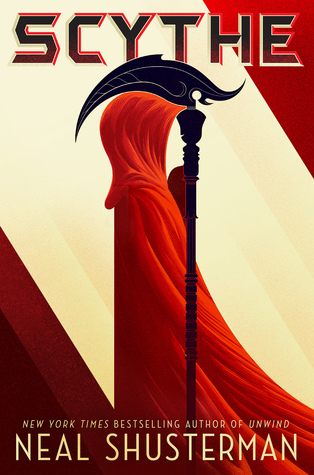Neal Shusterman
Scythe
Simon & Schuster
432 pages
8.2 (Best Book)
Blurb
Thou shalt kill.
A world with no hunger, no disease, no war, no misery. Humanity has conquered all those things, and has even conquered death. Now scythes are the only ones who can end life—and they are commanded to do so, in order to keep the size of the population under control.
Citra and Rowan are chosen to apprentice to a scythe—a role that neither wants. These teens must master the “art” of taking life, knowing that the consequence of failure could mean losing their own.
Review
The last three books that I read all revolve around death and how the main characters deal with it, admitting that death always changes people's life. Death is often deemed as a villain, and killing the others is usually a form of crime, but surprisingly only A Prisoner of Birth follows such motion. BothDo Androids Dream of Electric Sleep and Neal Shusterman's Scythe glorify death as something sacrosanct, and killing people is something honorable. Both books also don't admit that what they do is killing. They call it "retiring" in Do Androids Dream of Electric Sleep and "gleaning" in Scythe, sounding even more noble. But, one thing remains the same. Death always changes people's life.
On paper, Scythe looks great. A utopian world where people have stopped mortality where nanites are injected to their blood to speed-heal the wounds, and every dead people can be revived with a hi-tech machine. There's no famine, no war, no crime, no pollution, no corruption as now human beings are led by an extremely, uncorrupted AI, called Thunderhead. However, death is necessary, and the only thing that can bring death to human being is Scythe, some bunch of people that are allowed to kill other people, to bring the balance in this world. In this world, Scythe is feared, yet hailed at the same time. Scythe cannot be touched by Thunderhead, being the last human's prerogative. But, human is easily corrupted, and later this whole Scythe business becomes politics, filled with squalor and evilness.
Citra and Rowan are chosen to apprentice to a scythe that neither of them wants--the first condition to be a scythe--by Scythe Faraday, one of the most respectable Scythes in Midmerica. But, being a Scythe is not only a matter of killing human, it's much more than that. And when the their threads of fate loose, their lives are changing, and consequently, one of their lives must be sacrificed.
Scythe, in a way, bears some verisimilitude with Shusterman's magnum opus, Unwind. Both explore the meaning of a life of human being and what's their worth. The precious life that the main characters fight for in Unwind, that everyone deserves to live, and unwinding and erasing someone's existence from life is juxtaposed with the utopian condition in Scythe, where people no longer die, yet they still hold on their life so tightly. It's really interesting how both books have a lot of differences, but that creepy and shuddery feeling when I read the books stay, proving that the perfect life is actually a dystopia in life.
I have to be honest, Sycthe is really a page-turner, mainly because Scythe is full of mystery and intrigues. The main characters are also really likable, aside from their insta-romance, and the villain is hateable. It's rare to see black-white characters have interesting story to follow, but Shustermn does it perfectly. But, one thing that lacks from Scythe is the sense of thought-provoking that Unwind possesses. Scythe is great, of course, but it feels hollow. It's just an interesting story, without much left to learn, and the reason why I won't give much higher rating.

EmoticonEmoticon